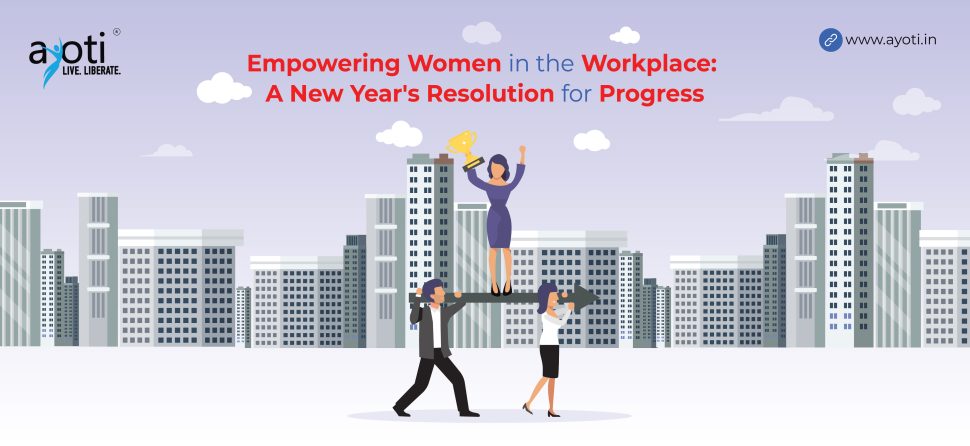By ayoti
Empowering Women in the Workplace: A New Year’s Resolution for Progress
The start of a new year is not only a time to make personal resolutions but also a great time to set goals to bring about positive changes in the workplace. One area that deserves our attention and efforts is women’s empowerment in professional settings. Despite tremendous advancements throughout time, gender differences in the workplace still exist, preventing us from realising our full potential and equality.
This blog explores the importance of empowering women and outlines actionable goals for a more inclusive and equal working environment.
The Current Landscape:
Although progress has been made, women still face significant challenges in the workplace. These issues—underrepresentation in leadership roles and the gender pay gap—highlight the necessity for a concerted effort to effect change. In many industries, women continue to struggle with stereotypes, biases, and barriers to career advancement. Recognising these challenges is the first step to building a more inclusive and empowered workplace.
- Promoting Equal Opportunities:
One of the primary goals for empowering women in the workplace is to ensure equal opportunities. This involves a commitment to fair hiring practices, unbiased promotions, and eliminating gender-based discrimination. Companies can implement blind recruitment processes, where resumes are reviewed without revealing gender, to mitigate unconscious bias. Additionally, creating mentorship programs that connect women with senior leaders can facilitate professional growth and guide them in navigating the complexities of the corporate world.
- Closing the Gender Pay Gap:
The gender pay gap remains a pervasive issue, with women earning, on average, less than their male counterparts for the same work. Organisations must conduct regular pay equity audits to identify and rectify any discrepancies. Transparent salary structures, where employees are aware of the criteria for compensation, can contribute to a fairer and more equitable pay system. Furthermore, fostering a culture that values and rewards performance, irrespective of gender, is essential in bridging the pay gap.
- Flexible Work Policies:
Empowering women in the workplace requires recognising and meeting the different needs of employees. Implementing flexible work policies, such as remote work options and flexible hours, can enable better work-life balance, especially for those juggling professional responsibilities with caregiving roles. This flexibility benefits women and creates a more inclusive work environment that values the unique circumstances of all employees.
- Investing in Professional Development:
Empowerment comes through continuous learning and growth. Businesses should support women’s professional development opportunities, including training programs, workshops, and conferences. By providing access to resources that enhance skills and knowledge, organisations can contribute to the advancement of women in their careers. Additionally, sponsorship programs that actively support the career progression of talented women can break down barriers and facilitate entry into leadership roles.
- Promoting a Supportive Workplace Culture:
A positive workplace culture is fundamental to empowering women. This involves creating an environment where diversity and inclusion are celebrated, and all employees feel respected and valued. Companies can establish employee resource groups focused on gender equality, conduct diversity and inclusion training, and promote a zero-tolerance policy for harassment. To ensure that the workplace continues to be supportive and empowering, it can be helpful to identify areas for development and to encourage open communication channels and feedback.
- Family-Friendly Policies:
Putting in place family-friendly policies—like paid parental leave, on-site daycare centres, and lactation rooms—is essential to creating an environment where the welfare of staff members with family responsibilities is given priority. Paid parental leave supports new parents during the critical early months and acknowledges the shared responsibilities of both mothers and fathers. Additionally, lactation rooms create a supportive environment for breastfeeding mothers, ensuring they can balance professional responsibilities while fulfilling their parenting roles. Together, these family-friendly initiatives create a workplace atmosphere that values work-life balance and inclusivity, benefiting working mothers and employees striving for a harmonious integration of professional and family life.
- Celebrating Achievements:
Promoting an empowered culture requires recognising and applauding women’s accomplishments in the workplace. This can be done through recognition programs, spotlighting success stories, and actively promoting the achievements of women at all levels of the organisation. By showcasing diverse role models, companies can inspire future generations and reinforce the message that success knows no gender.
Pave the Way to an Inclusive and Equitable Workplace:
As we embark on a new year, let us commit to empowering women in the workplace and creating environments where equality thrives. Organisations can contribute to a more inclusive, diverse, and empowering professional landscape by setting tangible goals and taking proactive steps. Together, we can build a future where every individual, regardless of gender, has the opportunity to thrive and reach their full potential.





